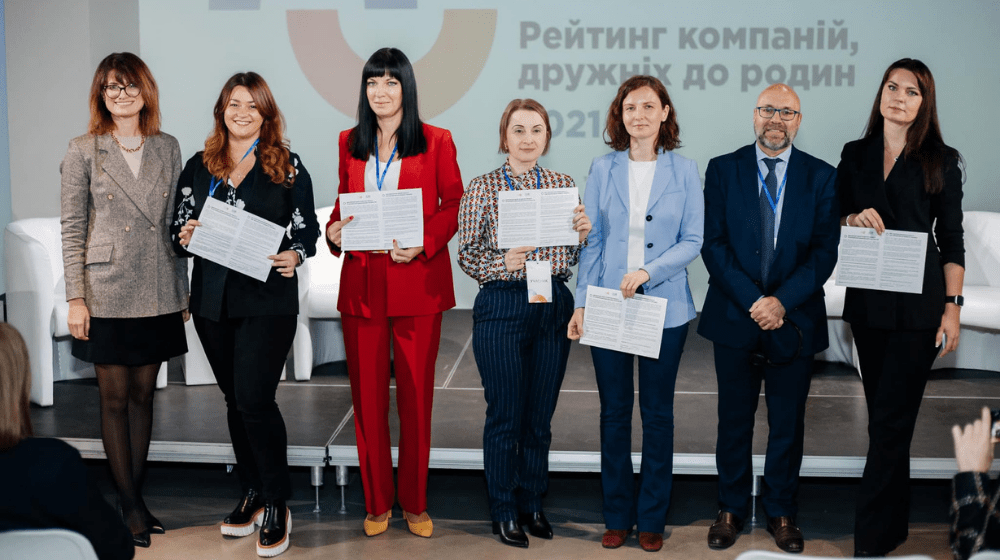On 23 November 2021, Kyiv, UNFPA Ukraine jointly with the Centre for CSR Development officially presented the results of the Family-Friendly Companies Rating conducted for the first time this year among Ukrainian employers.
The Rating included 50 companies from 16 sectors of the economy. The leaders were StarLightMedia in the Big Business category (over 250 employees), Polpharma South Africa in the Medium Business category (50 to 250 employees) and Nota Group in the Small Business category (10 to 50 employees). The awards were given to Eleks for Best Balance of Work and Family Practice; Intellias, Nestle, Danone and Unilever for Corporate Responsibility for Responsible Parenthood; and L’Oreal for Corporate Policies to Combat Domestic Violence.
“In September, in cooperation with our reliable partner, the United Nations Population Fund (UNFPA) in Ukraine, we began a large-scale search for family-friendly Ukrainian and international companies. The results of the Rating were a welcome surprise: most of the surveyed companies help their employees to balance work and family and promote equality between men and women in achieving their professional and personal goals. Boosting the development of further measures to attract more companies is one of the main priorities of the Springboard to Equality project. This will contribute to the continuation of the most important reforms to ensure equality in Ukraine,” said Deputy Prime Minister for European and Euro-Atlantic Integration Olha Stefanishyna.
“Although work-family balance practices are not yet widespread for companies in Ukraine, the results of the Rating show that most companies understand the importance and need to develop new management strategies that would prioritise the interests and needs of employees. The rating aims to recognise companies that are leaders in implementing work-family balance policies and to promote best practices among the Ukrainian business community,” said Jaime Nadal, Representative of the United Nations Population Fund (UNFPA) in Ukraine.
The evaluation was based on the following criteria: corporate culture, flexible working hours, workplace, social and financial support of families. According to the Rating, the vast majority of companies have corporate work-life balance policies (80%) and gender equality policies (78%). Almost all participating companies have implemented a flexible work schedule, where only hours worked are tracked, without fixed start and end times, or the ability to work remotely.
Responsible parenting programmes include additional paid days of maternity leave, additional paid days for parents at the birth of a child, significant dates in the child’s life, care for young children or family members in need of care; financial assistance at the birth of a child, child-friendly facilities and toilets, etc. Less common among Ukrainian companies is the practice of providing financial assistance for the education of children of employees and the creation of corporate kindergartens. These were claimed only by 10% and 2% of companies, respectively.
“StarLight Media brings together more than 2,000 talented people who create incredible products. It is very important that they feel needed and be able to fully realise their own creative, professional and personal potential. When we see that over the past year and a half, more than 100 employees have benefited from the parenting programme, more than 20 employees have taken extra days off for dads, and in one couple of StarLight Media employees, it was the father who went on paternity leave, these are cases that inspire us to keep working. From StarLight Media, I would like to remind all businesses that in dealing with this issue, you will see victories at a very human level, as well as at the managerial, reputational and business level,” said Yana Goncharenko, StarLight Media Sustainability Manager.
It should be noted that 40 companies operating in Ukraine have already signed the Declaration for Gender Equality and Against Domestic Violence, thus committing to the development of corporate practices and policies in these areas. In particular, during the official presentation of the results of the Rating, this Declaration was also signed by the Swedish company Electrolux:
“We are a Swedish brand, and the values of equality are in our DNA. For many years of Electrolux’s operation in Ukraine and other countries, this has become the norm. For us, approaches and policies of gender equality, inclusion, work-life balance are the basis and foundation; they are enshrined in international and local policies, as well as in the way of thinking of the people who come to the company,” said Kateryna Biloblovska, CEO at Electrolux.
“Ensuring gender equality is one of the key principles on which Swedish society is built. All citizens, regardless of gender, have the right to work and support themselves, as well as to balance work and family. This contributes to the equal involvement of both men and women in the labour market and has a positive impact on the country’s economic viability,” said Tobias Thyberg, Ambassador Extraordinary and Plenipotentiary of Sweden to Ukraine.
In addition to Electrolux, Unilever, Intellias, Nota Group and Polpharma UA also signed the Declaration today.
“The 2021 Rating itself was developed with the help of company employees, who helped determine both the main criteria and the number of points for checking them. According to the participating companies themselves, we already see that the Rating criteria will be a kind of roadmap for businesses to develop measures ensuring that companies can become more family-friendly and increase their employer brand. It is gratifying that the Rating will boost best practices in Ukraine,” said Maryna Saprykina, Head of the Centre for CSR Development.
Read the full version of the study at https://ukraine.unfpa.org/uk/BADVGE_rate
As you might recall, the purpose of the Rating was to identify companies that value families and to promote best practices. The Rating was conducted as part of the Springboard to Equality project implemented by the United Nations Population Fund (UNFPA) in Ukraine with the financial support of Sweden and the assistance of the Office of the Deputy Prime Minister for European and Euro-Atlantic Integration.


